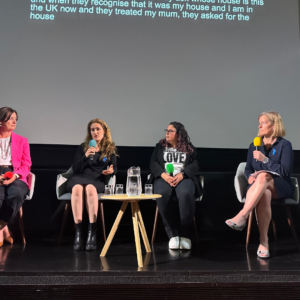Guest blog by Emma Cherniavsky (CEO, UK for UNHCR)
Refugee Week may only be seven days, but the ideas, messages and solidarity it brings to communities across the UK are something we take into the whole year.
Every June, Refugee Week provides a great opportunity for refugees, volunteers, community groups and the third sector alike to collaborate, share stories and mobilise others in support of the cause. Across the country, communities come together to pay tribute to the achievements, resilience and contributions of refugees here in the UK and around the world.
UNHCR’s 2022 Global Trends Report, released shortly before Refugee Week, showed that more than 108 million people were displaced by conflict and persecution around the world last year – the highest since records began. The majority of refugees continue to be hosted in low and middle income countries, close to their countries of origin. For refugees everywhere, including those arriving in the UK, starting a new life can be incredibly daunting. It is the help and support of individuals and local communities which helps them to rebuild their lives after being forced to flee.
Refugee Week is always a busy period in our calendars and 2023 was no exception. Against a backdrop of increased polarisation, it was a significant moment for people across the UK to put their compassion into action and express solidarity with refugees. It is a pinnacle moment for refugees to receive well-deserved recognition for building prosperity, growth and diversity across the country.
Seeing organisations across the sector join forces to launch Refugee Week set the tone for a programme fuelled by collaboration, solidarity and strength in unity. From cooking, to sport, to theatre and cinema, over 1,000 events acknowledged and celebrated the many ways refugees enrich our country.
Playing off the #CompassionIntoAction theme, many people and organisations used arts and culture to share what compassion means to them. Celebrations included short films, choir performances, podcasts, land art, painting sessions, poetry, various events at Glastonbury and more.
 Many events were available online, bringing people together across the country and from around world. It also felt like the first Refugee Week programme since 2019 in which organisations could be 100% confident from the outset about planning in-person events.
Many events were available online, bringing people together across the country and from around world. It also felt like the first Refugee Week programme since 2019 in which organisations could be 100% confident from the outset about planning in-person events.
In partnership with the Barbican in London, UK for UNHCR hosted two screenings of films with refugee themes, one of which was followed by a panel discussion featuring Refugee Week ambassador Zahra Shaheer and acclaimed film director Sally El-Hosaini. The films and discussions around them highlighted the unique journeys and remarkable achievements of refugees, along with the power of film to share their stories with audiences worldwide. I remember being amazed and inspired to hear from Sally El-Hosaini that her film The Swimmers had reached #1 on Netflix in more than 40 countries – talk about a global reach!
One of the highlights for all of us, year after year, is experiencing refugees sharing their stories and perspectives at a national level. Refugee Week’s film featuring the significance of compassion to their ambassadors shone a unique and insightful light on this concept. In a similar way, our own short film release, What is Home, featured displaced people from around the world sharing their personal reflections on the concept of ‘home’ and what it means to have to rebuild one.
A heartfelt thank you to Refugee Week and to all who shared their personal stories, and to the communities, organisations and individuals who worked so hard to make it a success. The week may be over now, but it is critical that we continue to recognise and celebrate the incredible achievements and resilience of refugees every day.
Instagram: unrefugeesuk
Twitter: UNRefugeesUK
Facebook: UK for UNHCR
LinkedIn: UK for UNHCR